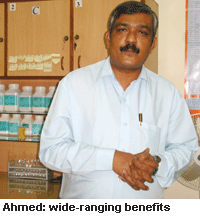Long before the idea of a computerised unique identity number for all Indians dawned upon the Union government, Asia’s first DNA Bank promoted by IQRA Biotech Services had been set up in Lucknow’s Biotech Park in June 2008, with the objective of providing every Indian with a DNA identification tag.
 Saeed Ahmed, Lucknow-based director of the bank, says it’s mandatory for all those who register for the service to submit a form detailing their paternal, maternal, anthropological and biometric details, together with a hard copy of finger prints, and specimen handwriting. “Subsequently four drops of blood are extracted with one drop subjected to analysis for DNA finger printing (unique for all individuals). The remaining three drops are stored as biological samples for the next 50 years. Next a microchip-based card is issued which contains anthropological and medical information, plus biometric details about the person. This information is also stored online, accessible at the click of a mouse, and can also be read by a smart card reader,” explains Ahmed.
Saeed Ahmed, Lucknow-based director of the bank, says it’s mandatory for all those who register for the service to submit a form detailing their paternal, maternal, anthropological and biometric details, together with a hard copy of finger prints, and specimen handwriting. “Subsequently four drops of blood are extracted with one drop subjected to analysis for DNA finger printing (unique for all individuals). The remaining three drops are stored as biological samples for the next 50 years. Next a microchip-based card is issued which contains anthropological and medical information, plus biometric details about the person. This information is also stored online, accessible at the click of a mouse, and can also be read by a smart card reader,” explains Ahmed.
According to him, the benefits of DNA identification are numerous and wide-ranging. In case of an accident, details of an injured/unconscious person can be immediately accessed to speed up treatment; during mass tragedies identification of bodies becomes easy; tracking of lost children is facilitated; and immigration authorities can use it for foolproof identification of persons. Similarly random checks in public transport can help identify people who might have supplied wrong credentials, while verification of candidates applying for selection in the police and armed forces can be facilitated.
If the card is lost or stolen, the unique identity number provided with it expedites access to information stored from any part of the world. Priced at a mere Rs.640, the ID tag takes only 15 days to process, and complete confid-entiality is guaranteed, says Ahmed. “Except in rare conditions when a court or investigating agency of another country requests us in writing, we will not divulge this information. Even the staff of the DNA Bank won’t know about your DNA and biological sample as they are coded,” he says.
One year down the road, enquiries about the DNA Bank are pouring in from far and wide. Rajasthan’s police department has asked the company to DNA finger print all prisoners and criminals; Malaysia has requested IQRA to establish a similar bank on a turnkey basis. Enquiries have also been received from Bangalore, Hyderabad, and Mumbai.
An alumnus of the All India Institute of Medical Sciences, Delhi and the University of Texas, Ahmed hopes to set up biometric systems at all trauma centres across the country. “Imagine the thousands of lives it will save. No more testing for blood and allergic reactions to medicines,” he says, dismissing suggestions that a DNA identity tag for all Indians is a huge and near-impossible project. “If you don’t have a dream, how will you ever realise it?” he asks rhetorically.
Vidya Pandit (Lucknow)